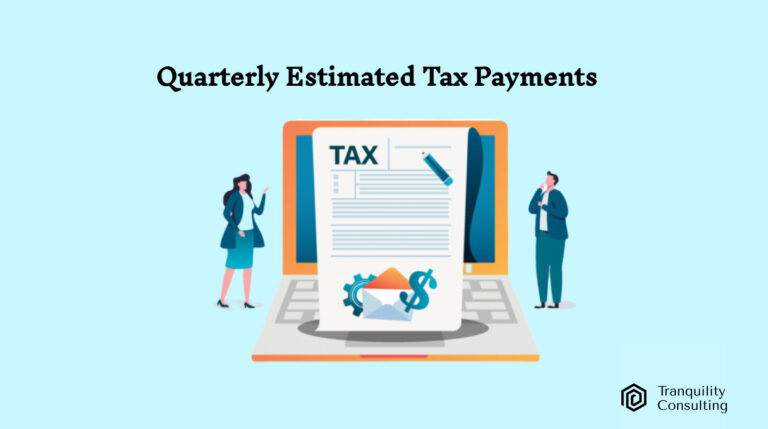Estimated tax payments are critical for many taxpayers, tiny business owners, freelancers, and independent contractors when managing finances. The U.S. tax system operates on a “pay as you go” basis, meaning income tax should be paid as you earn or receive your income throughout the year. For those who don’t have taxes automatically withheld from their income, making Estimated tax payments is essential to avoid penalties and stay in good financial standing.
What Are Estimated tax payments?
Estimated tax payments are estimated tax payments made four times a year to the IRS by individuals and businesses that do not have taxes automatically withheld. This typically includes self-employed individuals, small business owners, and those with significant investment income. The payments cover Social Security, Medicare, and income taxes. Since an employer doesn’t withhold taxes, it’s up to the taxpayer to calculate and pay their taxes every quarter.
Why Are Estimated tax payments Important?
- Avoiding Penalties: One of the primary reasons why Estimated tax payments are essential is to avoid penalties. The IRS penalizes taxpayers who fail to pay enough tax throughout the year. If you owe more than $1,000 in taxes at the end of the year and need to make sufficient Estimated tax payments, you’ll likely face an underpayment penalty. By making accurate estimated payments, you can avoid this situation.
- Cash Flow Management: Estimated tax payments help with cash flow management. Instead of facing a large tax bill at the end of the year, paying taxes estimated spreads out the financial burden, making it easier to manage. This is especially beneficial for small business owners and freelancers with variable incomes throughout the year.
- Compliance with Tax Laws: Paying your taxes estimated ensures you stay compliant. The U.S. tax system is designed to pay taxes as income is earned. By adhering to the estimated tax payment schedule, you’re fulfilling your legal obligations and avoiding the stress of last-minute tax payments.
- Financial Planning: Estimated tax payments require regularly reviewing your income and expenses. This encourages better financial planning and keeps you informed about your financial health throughout the year. Knowing where you stand financially can help you make informed decisions and adjustments as needed.
Who Needs to Make Estimated tax payments?
Only some people are required to make Estimated tax payments. The IRS typically requires estimated tax payments from individuals and businesses that expect to owe $1,000 or more in taxes when their return is filed. This usually applies to:
- Small business owners: Those who operate their own businesses and do not have taxes withheld through payroll may need to make estimated tax payments to cover their income tax, self-employment tax, and other tax liabilities.
- Self-employed individuals: This includes freelancers, independent contractors, and small business owners who do not have taxes withheld from their income.
- Investors: Those with substantial investment income, such as dividends, interest, and capital gains, may need Estimated tax payments.
- Landlords: Rental income is subject to tax, and if taxes aren’t withheld from this income, landlords may need to pay estimated tax.
- Corporations: Corporations generally need to make Estimated tax payments if they expect to owe $500 or more in taxes.
How to Calculate Estimated tax payments
Calculating Estimated tax payments can be complex if your income varies yearly. Here’s a simplified approach:
- Estimate Your Income: Calculate your expected income for the year, including self-employment income, interest, dividends, and any other sources of revenue.
- Subtract Deductions and Exemptions: Subtract any deductions and exemptions you’re eligible for, such as the standard deduction, mortgage interest, and contributions to retirement accounts.
- Apply the Tax Rate: The tax rate corresponds to your estimated income. Be sure to consider both federal and state taxes.
- Divide by Four: Once you have your annual estimated tax liability, divide it by four to determine your estimated tax payment.
The IRS provides Form 1040-ES, which includes a worksheet to help calculate your Estimated tax payments. Revisiting your calculations throughout the year is essential, especially if your income changes.
Consequences of Not Making Estimated tax payments
Failing to make Estimated tax payments can lead to several negative consequences:
- Underpayment Penalty: The IRS may impose an underpayment penalty if you don’t pay enough yearly taxes. This penalty is calculated based on the amount you underpaid and the period the underpayment occurred.
- Interest Charges: Besides penalties, the IRS charges interest on unpaid taxes. The interest rate is determined estimated, and is generally higher than what you might earn in a savings account.
- Increased Tax Bill: If you don’t make Estimated tax payments, you could face a large tax bill at the end of the year. This can be a financial burden and lead to cash flow issues.
- Stress and Anxiety: Not staying on top of your tax obligations can lead to stress and anxiety, especially as tax deadlines approach. Making Estimated tax payments ensures you’re prepared and reduces the likelihood of unpleasant surprises.
How to Make Estimated tax payments
The process of making Estimated tax payments is straightforward. Here are the steps:
- Determine Your Payment Amount: Use Form 1040-ES to calculate your payment or consult with a tax professional.
- Choose a Payment Method: The IRS offers several payment methods, including online payments through the IRS Direct Pay, the Electronic Federal Tax Payment System (EFTPS), and by mail using a check or money order.
- Keep Records: Record your payments, including the date and amount paid. This will be important when filing your annual tax return.
- Adjust as Needed: If your income changes throughout the year, adjust your Estimated tax payments accordingly. It’s better to pay more each quarter than to underpay and face penalties.
Working with a Tax Professional
While it’s possible to calculate and make Estimated tax payments independently, working with a tax professional can provide peace of mind. A tax professional can help you:
- Accurately Calculate Payments: Ensure your payments are accurate based on income and deductions.
- Plan for Tax Obligations: Develop a tax strategy that minimizes your tax liability and maximizes your deductions.
- Avoid Penalties: Stay compliant with tax laws and avoid penalties.
Conclusion
Making Estimated tax payments is a legal requirement for many taxpayers and an innovative financial practice. It helps you avoid penalties, manage cash flow, stay compliant with tax laws, and maintain better control over your finances. Whether you’re a small business owner, freelancer, or investor, understanding the importance of Estimated tax payments is crucial for long-term financial health. For personalized guidance and expert assistance with your tax obligations, consider working with a trusted tax professional like Tranquility Consulting. With the proper support, you can ensure that your taxes are managed efficiently and effectively, allowing you to focus on what you do best running your business and achieving your financial goals.
FAQs
- What are Estimated tax payments?
- Estimated tax payments are estimated payments made to the IRS by individuals and businesses that do not have taxes automatically withheld from their income.
- Who needs to make Estimated tax payments?
- Self-employed individuals, small business owners, and those with significant investment income typically need to make Estimated tax payments.
- What happens if I don’t make Estimated tax payments?
- Failing to make Estimated tax payments can result in penalties, interest charges, and a larger tax bill at the end of the year.
- How can I calculate my Estimated tax payments?
- You can use IRS Form 1040-ES to estimate your tax payments or consult a tax professional for accurate calculations.
- How can Tranquility Consulting help with my Estimated tax payments?
- Tranquility Consulting provides expert tax advice and planning services to ensure your Estimated tax payments are accurate and timely, helping you avoid penalties and manage your tax obligations efficiently.
If you have any questions or need business-related tax consulting advice, please contact us at: [email protected]





